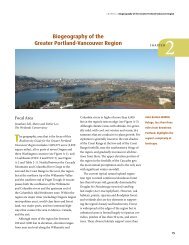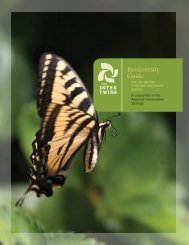Biodiversity Guide - The Intertwine
Biodiversity Guide - The Intertwine
Biodiversity Guide - The Intertwine
Create successful ePaper yourself
Turn your PDF publications into a flip-book with our unique Google optimized e-Paper software.
egional conservation strategybiodiversity guideChapter 5 Fish and Wildlife of the RegionTable 5-1Examples of Native Terrestrial Macroinvertebrates of the Greater Portland-Vancouver RegionSpecies or Group Population Status Causes or CommentsNative Slugs and Snails Declining Habitat loss or alteration, competition with exotic slugs andsnails, exotic predators and parasitesNative Earthworms (e.g., Oregon giant Declining or extinct Habitat loss or alteration, competition with exotic earthworms, exoticearthworm, Driloleirus macelfreshi)earthworms, exotic predators and parasitesClown Millipede, Harpaphe haydeniana Uncertain or declining Habitat loss or alteration; possible keystone species of detritusnutrient cycling(Speyeria zerene) and field crescent (Phyciodestharos) butterflies may also be extirpated from theregion.Invertebrates are found in every habitat typein the greater Portland-Vancouver region, fromthe soil to the tops of trees, and in every body ofwater, including streams, rivers and wetlands. <strong>The</strong>sheer number and mass of invertebrates reflecttheir enormous ecological influence. Althoughsome invertebrates have a negative impact onhumans (either directly as disease agents or byattacking food crops), the adverse effects pale incomparison to invertebrates’ essential beneficialactions. Invertebrates are a critical part of nearlyevery food chain; they serve both as food forother animals and or as agents in the endlessrecycling of nutrients in the soil. Food webs oftendepend on critical species performing essentialservices such as pollination or seed dispersal(see “Pollinators and Pollinator Conservation” inChapter 6).Conservation Issues and ThreatsInsects are threatened by the same destructiveforces that affect many other animals. Accordingto the International Union for Conservation ofNature, the leading causes of decline are habitatdestruction, displacement by introduced plantand animal species, alteration of habitat by chemicalpollutants (such as pesticides), hybridizationwith other species, and overharvesting.Conservation Issues and Threats inTerrestrial HabitatsHabitat Loss, Degradation, and FragmentationHabitat loss and fragmentation are often citedas the most significant factors in decline ofinvertebrate species. Factors causing habitat lossand fragmentation include increasing urbanization,expansion of intensive agriculture, invasiveplants, and climate change.Introduced Plant and Animal Species<strong>The</strong>re are few studies of the direct effects ofnon-native plants on native insects. Introduced,non-native plants compete with native plants forresources, alter habitat composition, and causesignificant reductions in the abundance anddiversity of pollinators and other herbivorousinsects (see Table 5-2). <strong>The</strong>re is also evidence thatnative pollinator insects prefer native plants, eventhough many native insects will feed on nonnativeplants when few natives are available.<strong>The</strong> Oregon Department of Agricultureestimates that there are about 1,000 species ofexotic terrestrial invertebrates in Oregon. BecausePort of Portland facilities have been the primarypoint of entry for exotic terrestrial invertebratesin Oregon, most of these 1,000 exotic species arefound in the greater Portland-Vancouver region.Unlike with habitat alteration or loss, once anexotic animal or plant species is established itspresence is usually permanent unless aggressiveefforts are made to eradicate it. <strong>The</strong>se efforts mayharm native invertebrates and cost a lot of timeand money.Pacific Black-legged Tick, Ixodes pacificus Increasing Increased urban/forest interface, more deer; vector of LymediseaseWahkeena Falls Flightless Stonefly, Unknown Known only from Wahkeena Falls, westernZapada wahkeenaColumbia River GorgeGrasshoppers (several species) Increasing Disturbance specialists; conversion of woodlands to pastureor agricultureGiant Silkmoths (e.g., Polyphemus moth, Unknown, some species may be declining Habitat/host destruction,Antheraea polyphemus)invasive plants, non-target biocontrol agent effects, exotic bird predatorsSome Predatory Carabid Beetles Increasing Habitat generalists(e.g., Pterostichus algidus,Scaphintous marginatus)Carabid Beetle, Promecognathus crassus Unknown Specialist predator of clown millipedeCarabid Beetle, Acupalpus punctulatus Unknown or declining Wetland specialist; until recently only known from Forest Grove in 1941Carabid Beetles, Unknown Waterfall plunge pool splash zones in western Columbia RiverPterostichus johnsoni and P. smetaniGorge; P. smetani known only from that areaTrout Stream Beetles (e.g., Amphizoa striata) Unknown or declining Require fast, clear, clean water; specialist predators of stonefly larvaeEctoparasitic Mammal Beetles Unknown L. aplodontiae on mountain beaver; P. castoris on true beaver; abundance(e.g., Leptinullus aplodontiae anddepends on host abundancePlatypsyllus castoris)Metallic Wood-boring Beetle, Buprestis gibbsii Declining? Specialist on large, fallen oak branches or trunksNative Ladybird Beetles Some declining Competition and predation by exotic ladybird beetles (e.g., Coccinellaseptempunctata and Harmonia axyridis)Mountain Beaver Flea, Dolichopsylla stylosus Unknown Only host is mountain beaver; abundance depends on host abundance;world’s largest fleaNative Ants (e.g., species of Formica) Increasing Disturbance specialists; anthropogenic habitats favor many ant speciesNative Bumblebees Declining Habitat alteration or loss, exotic pathogens and parasites, competition(e.g., Bombus occidentalis)with exotic bumblebeesNative Butterflies Declining Habitat loss and alteration(e.g., Icaricia icarioides fenderi ;Erynnis propertius; Pyrgus communis;Atalopedes campestris; Parnassius clodius)72 73




